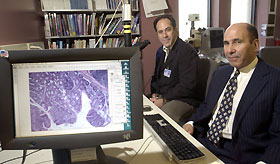|
This is an archived article.
For the latest news, go to the Advance Homepage
For more archives, go to the Advance Archive/Search Page. |
||
|
Researchers Seek To Identify
Working together, one in the clinic with patients, and the other in the laboratory with tissue and cells, Dr. Joel Levine, professor of medicine, and Daniel Rosenberg, associate professor of molecular medicine, are trying to identify the very earliest stages of colon cancer, a leading cause of cancer death in both men and women. It is a collaboration that is bridging the gap between research and clinical care, which is the intent of the Health Center's signature programs in cancer, cardiology and musculoskeletal health.
"If we can identify the molecular or genetic markers or fingerprints of colon cancer, then we can begin to identify patients who are at high risk of developing the disease and offer them preventive measures like dietary or drug therapies before they ever develop it," says Levine, co-director with Rosenberg of the newly established program in colorectal cancer. Traditionally, the outcome of colon cancer for a patient remains a function of the complexity of the disease at the time of diagnosis. "That means, the more advanced the colon cancer at the time of its discovery, the poorer the outcome," Levine says. Together, Levine and Rosenberg are looking at genes in human tissue obtained by colonoscopies to see if they can identify gene targets that may be a signature or marker for the risk of cancer. "If the targets are confirmed, through rigorous validation studies, then they or their gene-directed protein product could become a biomarker for early detection of the risk for colon cancer," says Rosenberg. The procedure for looking at the genes in human tissue is similar to the methodology Rosenberg has been using on mouse colonic epithelium, or lining. The mouse is a useful experimental model because of the large number of genes it shares with humans. The approach, known as gene profiling, compares gene activity in healthy cells and in cells at different stages in the development of cancer. "The study of animal models of colon cancer has demonstrated that the earliest morphologic or structural change is the formation of a collection of very small colonic crypts that may appear decades before the appearance of observable polyps," says Rosenberg, who came to the Center for Molecular Medicine three and one-half years ago from the School of Pharmacy at Storrs. "These aberrant crypt foci, or ACF, appear to be crucial to the development of malignant tumors in mice long before actual cancer occurs." Unfortunately, ACF cells in humans are so tiny they are invisible to traditional magnifying colonoscopy. To study them, Levine has established a scientific collaboration with Olympus Corporation to use a prototype colonoscope that can detect and retrieve samples of these tiny cells on the colon wall. Rosenberg will examine the lesions, using gene profiling, to see if they can determine which ones might develop into cancer and which will not. "Our goal is to determine the very earliest molecular signature of colon cancer so we can identify those most at risk and help discover new ways to block cancer from ever developing," says Rosenberg. Adds Levine: "Up-to-date clinical care depends on first-rate laboratory research. The days of the separation of clinical care and scientific investigation are over." |

